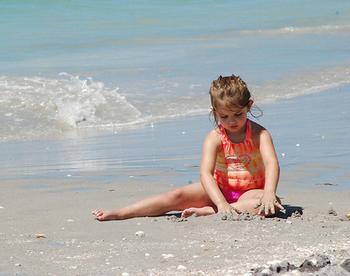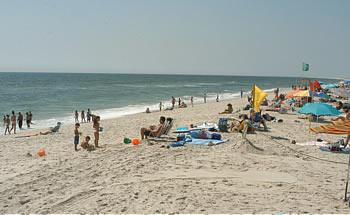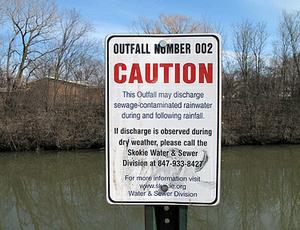Climate Change Worsens U.S. Beachwater Pollution, NRDC Reports
WASHINGTON, DC, July 29, 2009 (ENS) – Polluted water at American beaches jeopardized the health of swimmers last year and climate change is making conditions worse, according to the 19th annual beachwater quality report released today by the Natural Resources Defense Council. Climate change is expected to further increase the presence of pathogens that cause stomach flu, diarrhea and neurological problems in America's beachwater.
The number of closing and advisory days at ocean, bay and Great Lakes beaches reached more than 20,000 for the fourth consecutive year, finds the report, which is based on data from the U.S. Environmental Protection Agency.
NRDC's report, "Testing the Waters: A Guide to Water Quality at Vacation Beaches," confirms that nationally seven percent of U.S. beachwaters are contaminated with human and animal waste that can make people sick. The highest level of contamination was found in the Great Lakes, where 13 percent of beachwater samples violated public health standards.
 |
Girl plays in the sand at Venice Public Beach, Florida. (Photo by Vanessa Guzan) |
"Pollution from dirty stormwater runoff and sewage overflows continues to make its way to our beaches. This not only makes swimmers sick – it hurts coastal economies," said Nancy Stoner, NRDC Water Program co-director.
For the first time this year, the effects of climate change were factored into the beachwater quality report. "The combined effects of temperature increases, and more frequent and intense rainstorms, will lead to increased stormwater runoff, sewer pollution and disease-causing pathogens in nearby waterways," the report states.
Beachwater pollution makes swimmers vulnerable to waterborne illnesses such as stomach flu, skin rashes, pinkeye, ear, nose and throat problems, dysentery, hepatitis, respiratory ailments, and neurological disorders. "For senior citizens, small children and people with weak immune systems, the results can be fatal," the report states.
"Nobody wants their trip to the beach to send them to the bathroom or, worse, the emergency room," said Stoner. "It is vitally important to remember that if it has recently rained – or you see or smell a pipe discharging onto the beach – keep your head above water or avoid swimming altogether."
The report provides a 5-star rating guide for 200 of the nation's most popular beaches, based on indicators of beachwater quality, monitoring frequency, and public notification of contamination.
Five-star beaches are the cleanest. They include Gulf Shores Public Beach, Alabama; Laguna Beach-Main Beach, California; Bolsa Chica State Beach in Huntington Beach, California; Newport Beach, California; Ocean City, Maryland; Park Point – Community Club Beach in Duluth, Minnesota; and Hampton Beach State Park in Hampton, New Hampshire.
 |
Jones Beach State Park (Photo courtesy N.Y. State Parks) |
One-star, or lowest ranking beaches, include Zach's Bay at Jones Beach State Park in Wantagh, New York; Ocean Beach Park in New London, Connecticut; Venice Public Beach, Florida; and Central Beach in Point Pleasant, New Jersey.
While the report found a 10 percent decrease in closing and advisory days at beaches nationwide from 2007, it reveals this drop was the result of dry conditions in many parts of the country and decreased funding for water monitoring in some states last year, rather than a sign of large-scale improvement. The decline follows two years of record-high closing and advisory days.
The primary pollution source, stormwater runoff after heavy rains, continues to be a serious problem that has not been addressed.
"When the rains return," Stoner said, "so will pollution, forcing beaches to issue more closings and advisory days."
States with the highest percentage of samples exceeding health standards in 2008 were Louisiana (29 percent), Ohio (19 percent), Indiana (18 percent) and Illinois (15 percent).
Those with the lowest percent of water samples exceeding health standards last year were Delaware, New Hampshire and Virginia.
While there was an overall decrease in closing and advisory days from 2007 nationwide, from 22,571 to 20,341 days, regionally the picture varied.
Dry conditions led to decreases in closings and advisories for 2008 in the Delmarva Peninsula (67 percent), Gulf of Mexico (39 percent), California and Hawaii (21 percent), and the Southeast (12 percent).
 |
Sewage outfall warning near Chicago (Photo by Lance Szydzik) |
Wetter than usual conditions led to an increase in closing and advisory days in New England (64 percent) and the Great Lakes (13 percent).
Federal, state and local governments prevent beachwater pollution by requiring better controls on stormwater and sewage, the NRDC urges.
The organization recommends low impact development techniques to retain and filter stormwater, letting it soak into the ground by using rain gardens in yards, tree boxes on city sidewalks, green roofs on top of buildings, and permeable pavement instead of asphalt or concrete.
The NRDC is using the report as a platform to lobby for passage of the Clean Coastal Environment and Public Health Act now pending in Congress. This bill would provide money for more beachwater sampling and require use of faster testing methods so people get timely information about whether it is safe to swim.
In part because of the effects of climate on beachwater pollution, the NRDC supports the American Clean Energy and Security Act that recently passed the House of Representatives, saying that by capping greenhouse gases the measure will help communities prepare for further impacts of climate change on coastal communities such as flooding, sea level rise, increased stormwater pollution and sewer overflows.
The Senate is poised to consider similar legislation after Labor Day.
"Americans should not suffer the consequences of contaminated beachwater," Stoner said. "From contracting the flu or pink eye, to jeopardizing millions of jobs and billions of dollars that rely on clean coasts, there are serious costs to inaction."
Click here for tips on a safe trip to the beach this summer.
Copyright Environment News Service (ENS) 2009. All rights reserved.
To subscribe or visit go to: http://www.ens-newswire.com